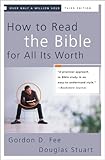 This last week I have run into two resources that have put helpful words to a thought I’ve been trying to communicate: the necessity of community, and especially studied and experienced teachers within that community, and wider connection to good resources outside your community in order to correctly understand the meaning of the Bible.
This last week I have run into two resources that have put helpful words to a thought I’ve been trying to communicate: the necessity of community, and especially studied and experienced teachers within that community, and wider connection to good resources outside your community in order to correctly understand the meaning of the Bible.
There is an errant thought pervasive today (and probably throughout the last several centuries since the reformation), that you will be able to completely understand the meaning of scripture from reading a single English translation with the “help of the Holy Spirit”. Poorly understood proof texts are used to support this idea, but it is a false one.
The first thought came up in Don Carson and Tim Keller’s statement on The Elephant Room 2.
There is a kind of appeal to Scripture, a kind of biblicism—let’s call it Biblicism One—that seems to bow to what Scripture says but does not listen to the text very closely and is almost entirely uninformed by how thoughtful Christians have wrestled with these same texts for centuries. There is another kind of biblicism—let’s call it Biblicism Two—that understands the final authority in divine revelation to lie in Scripture traceable to the God who has given it, but understands also that accurate understanding of that Scripture is never supported by bad exegesis and always enriched by the work of Christian thinkers who have gone before.
The second thought appeared in an excellent book: How To Read The Bible for all Its Worth (yes, its, not it’s).
The first reason one needs to learn how to interpret is that, whether one likes it or not, every reader is at the same time an interpreter. That is, most of us assume as we read that we also understand what we read. We also tend to think that our understanding is the same thing as the Holy Spirit’s or human author’s intent. However, we invariably bring to the text all that we are, with all of our experiences, culture, and prior understandings of words and ideas. Sometimes what we bring to the text, unintentionally to be sure, leads us astray, or else causes us to read all kinds of foreign ideas into the text.
They go on to describe the importance, therefore, of expert input and interpretation tools, such as multiple good Bible translations, Bible dictionaries, and a good commentary or three.
This is part of what I talked about this December in my seminar on the right pursuit of theological knowledge.
It all sounds so “unspiritual”, and some have called it “cold and academic”, wondering where in the world this “dynamic relationship” is! But isn’t it amazing that God doesn’t simply spoon feed us? He asks us to grow up, think hard, reason well, be humble, study, and work together to understand Him!
Certainly He is there to be found in quiet places. Certainly He speaks to us personally, but in the same way that we nurture our children to be self-sustaining, so that we can more fully enjoy their company and relationship, so God teaches us and trains us, and makes us walk and fly and think on our own, to His Glory.
Leave a Reply